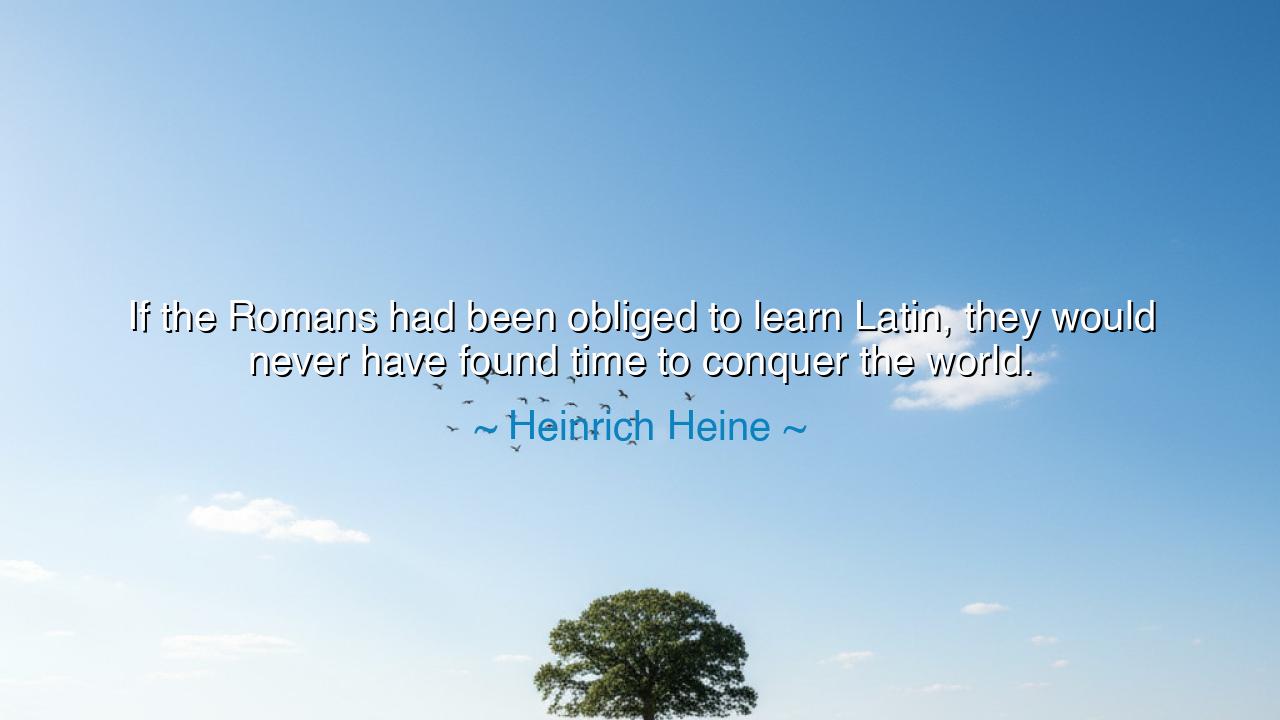
If the Romans had been obliged to learn Latin, they would never
If the Romans had been obliged to learn Latin, they would never have found time to conquer the world.






In the sharp wit of Heinrich Heine, the German poet and philosopher, there lies a timeless truth cloaked in humor: “If the Romans had been obliged to learn Latin, they would never have found time to conquer the world.” These words, playful on the surface, conceal a deep meditation on the nature of action and intellect, on the balance between learning and doing, thought and conquest. Heine’s remark reminds us that civilizations rise not by contemplation alone, but by the will to act — by courage, by motion, by the audacity to step beyond the perfection of theory into the imperfection of life.
The Romans, after all, did not stop to debate the intricacies of their own language. They built roads across continents, raised aqueducts that defied time, and shaped the laws that would echo through millennia. Their genius was not in endless study, but in practice, in the living art of creation through discipline and daring. Heine’s jest exposes a paradox of the human mind: that in seeking perfection of understanding, we often delay the birth of greatness. For too much reflection can become a prison; the scholar who fears error never writes, and the general who fears defeat never marches.
In this, Heine speaks to all generations — to those who would rather polish their knowledge than test their strength. To “learn Latin” is to become consumed by form rather than spirit, to worship the tools instead of using them. The Romans were masters not because they studied their own tongue, but because they lived their destiny with purpose and power. Their words became immortal precisely because they did not pause to polish them. History, after all, does not remember the grammarians, but the doers — those who dared, who failed, and who built anew.
Consider the story of Alexander the Great, tutored by the wise Aristotle, who filled his mind with philosophy, logic, and ethics. Yet Alexander’s greatness did not lie in the scrolls of his teacher, but in the fire of his action. When he crossed the Hellespont and gazed upon the endless lands before him, he did not wait for perfect knowledge — he trusted the strength of his vision. Had he waited until he mastered all that Aristotle could teach, he would have died an unknown prince. Like the Romans, his wisdom was in motion, not hesitation.
Heine’s irony, then, is not a mockery of learning, but a warning against its tyranny. Knowledge is sacred, but only when it serves life, not when it replaces it. The world has seen too many thinkers who never act, too many dreamers who never build. The Romans, by contrast, learned by doing. Their mistakes carved the path of progress; their empire was not a monument to perfection, but to perseverance. True wisdom, Heine implies, lies in knowing when to stop studying and start creating, when to turn knowledge into conquest — not of nations, but of possibility itself.
The ancients taught that the sword and the pen are brothers, each incomplete without the other. Yet one must strike before the other can record. The mind must serve the spirit, not restrain it. To hesitate endlessly before beginning is to be conquered by one’s own doubts. The Romans acted first, reflected later — and thus they shaped the destiny of the Western world. In their boldness we see the secret of creation: that action, though imperfect, is more divine than hesitation dressed in wisdom.
The lesson, then, is this: do not become a prisoner of preparation. There is a season for learning, but also a season for doing. The perfection you seek through study will never come — and it need not. Begin with what you have, imperfectly but earnestly, and you will find that mastery comes through the march, not the lecture. Do not wait to feel ready, for readiness is the illusion that stops heroes at the threshold of their own greatness.
So, my listener, remember Heine’s jest as a sacred truth: those who conquer are those who dare to act before they feel complete. The Romans did not pause to perfect their speech; they perfected their destiny. Therefore, learn what you must — but then rise, take up your purpose, and build your empire in whatever field your heart has chosen. For wisdom is not found in endless study, but in the courageous act of turning knowledge into life.






AAdministratorAdministrator
Welcome, honored guests. Please leave a comment, we will respond soon